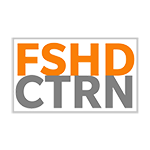Search Results

Aug 4, 2024, 11:03 AM
MOVE FSHD study update.

Feb 17, 2024, 5:59 PM
An update on the MOVE FSHD study.

Oct 10, 2023, 5:23 PM
Latest update from the MOVE grant.

Feb 5, 2023, 12:03 PM
This large study will be a big achievement in the FSHD community, a reality that has been made possible by the support from Friends of FSH Research.

Jun 18, 2021, 3:34 PM
Article published by University of Kansas Medical Center provides insight into work by Dr. Jeffrey Statland, partially supported through multiple grants from Friends of FSH Research.

Jun 4, 2021, 10:58 AM
Dr. Tawil provides an update to his multi-year grant.

May 7, 2021, 4:37 PM
Dr. Tawil provides a final progress update.

Sep 14, 2020, 4:48 PM
Dr. Rabi Tawil provides an update on the expansion of the ReSolve Study to include two European Sites.

Jul 23, 2020, 4:22 PM
A grant to Drs. Statland and Tawil in support of a multi-year study.

Jun 11, 2020, 10:08 AM
Dr. Tawil provides an update on extended genetic testing for current and new patients in the National Registry.

Nov 6, 2019, 3:25 PM
Clinical Trial Readiness to Solve Barriers to Drug Development in FSHD (ReSolve FSHD).

Aug 5, 2019, 10:19 AM
Dr. Tawil provides an update on year three of his project to get genetic testing performed for those in the registry who do not have it, and thus create a larger viable pool for upcoming clinical trials.

Aug 1, 2019, 12:08 PM
Dr. Tawil provides a brief update on the two CTRN European sites funded.

Jul 19, 2019, 2:28 PM
Clinical Trial Readiness to Solve Barriers to Drug Development in FSHD (ReSolve FSHD).

Nov 5, 2018, 5:19 PM
Dr. Tawil provides a brief update on the two CTRN European sites funded.

Aug 1, 2018, 1:00 AM
Dr. Tawil discusses his historical relationship with FSHD and the future of potential therapies.

Jul 5, 2018, 11:47 AM
Dr. Tawil provides an update on year two of his project to get genetic testing performed for those in the registry who do not have it, and thus create a larger viable pool for upcoming therapeutic trials.

Jun 1, 2018, 7:48 AM
Genea Biocells announced that it has been granted Orphan Drug Designation by the U.S. Food and Drug Administration (FDA) for its therapeutic candidate, GBC0905,

May 25, 2018, 11:43 AM
As multiple drug companies pursue treatments for FSHD, there is an urgent need to define the clinical trial strategies which will hasten drug development, including creating disease-relevant outcome measures and optimizing inclusion criteria. This proposal will develop two new outcome measures and optimize eligibility criteria by testing 160 patients in 7 sites over a period of 18 months.

May 30, 2017, 6:07 PM
Progress update from Dr. Tawil on making the National Registry more useful for research by providing genetic testing.

Nov 21, 2016, 11:39 AM
Dr. Rabi Tawil discusses the National Registry based in Rochester, NY.

Feb 3, 2015, 9:07 AM
Progress update from Drs. Miller and Tawil.

Jul 16, 2014, 9:42 PM

Oct 29, 2010, 4:14 PM
An international research consortium shows that FSHD muscle nuclei are poised for expression of the toxic DUX4 protein.

Oct 21, 2010, 3:58 PM
University of Rochester published interview with Dr. Rabi Tawil.

Sep 20, 2010, 3:45 PM
An international collaboration identifies a region of DNA necessary for FSHD and focuses attention on DUX4 as the cause of muscle deterioration.

Jun 26, 2010, 2:46 PM
Five-year NIH grant to a consortium of FSHD research labs.

Jun 2, 2009, 1:58 PM
Facioscapulohumeral muscular dystrophy (FSHD), caused by partial deletion of the D4Z4 macrosatellite repeat on chromosome 4q, has a complex genetic and epigenetic etiology. To develop FSHD, D4Z4 contraction needs to occur on a specific genetic background. Only contractions associated with the 4qA161 haplotype cause FSHD.

Jun 1, 2009, 1:27 PM
Several genes have been examined as candidates for causing FSHD, including the DUX4 homeobox gene in the D4Z4 repeat, but none have been definitively shown to cause the disease, or has the full extent of transcripts from the D4Z4 region been carefully characterized.

Apr 15, 2008, 11:46 AM
$6.3 Million Dollar Grant for FSH Research — The Pathogenesis of FSHD.





Connect with us on social media